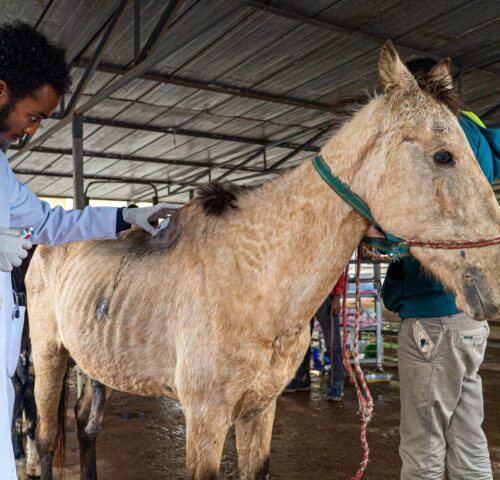Working animals are suffering from the unbearable agony of preventable harness wounds
Sadly, injuries caused by poorly made harnessing are some of the most common conditions seen by SPANA veterinary teams. In many of the countries where we work it’s impossible to find well-fitting, professionally made harnesses.
Instead, working animal owners are forced to fashion their own from materials such as hard-edged plastic, stringy pieces of twine and rough nylon. This can lead to terrible wounds and potentially deadly infections.
Harness wounds continue to cause working animals terrible distress. Will you please donate today to help give them the treatment and safe equipment they deserve?
Amara’s agonising harness wounds
Over rough roads in rural Ethiopia, Amara, an 11-year-old donkey, pulls a heavy cart to help his owner, Gebrie, make a living for his family. His days are spent transporting farm produce or pulling backbreaking loads of stone and sand, which are sold to make cobblestones. It’s exhausting work.
A few months ago, Gebrie noticed that Amara was more lethargic than usual. He was struggling to walk and when Gebrie removed his harness after a long 10-hour day, he noticed that nasty wounds had opened up across Amara’s back.
Seeing his donkey in pain and concerned for his welfare, Gebrie took Amara to the SPANA mobile clinic in nearby Wogera.
Once there, our vets removed the dead tissue from the wounds, then drained, flushed and disinfected them. The vets noticed signs of infection in the largest and most painful wound, which was between his shoulder blades. This suggested Amara could have fistulous withers, an infection caused when wounds along the spine get infected. Untreated, it can lead to immense pain, fever and lameness.
The vets cleaned and bandaged the wound and gave Amara antibiotics to treat his condition and prevent a potentially life-threatening infection.
The vets also explained to Gebrie that the wounds had been caused by Amara’s ill-fitting harness and from pulling loads that were too heavy. They encouraged him to wash his donkey’s wounds to keep them clean and help them heal. They also showed him how to fit a padded harness to improve Amara’s comfort while working.
Simply by improving Amara’s harnessing and not overloading his cart, Gebrie could vastly reduce his donkey’s terrible suffering and save him from a possible deadly infection.
If you can, please donate today. Your donation could provide immediate relief to working animals and stop these preventable wounds causing agony in the future. Thank you so much.
Thank you
Your generous donations will be used for projects such as those featured in this harness wounds appeal and where they are required the most to help animals in need.


